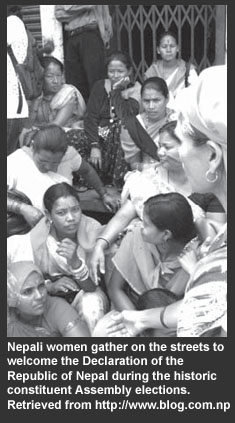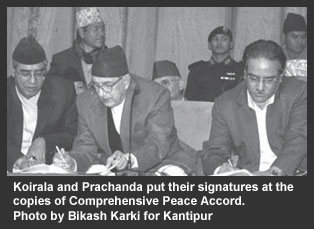Introduction
On 15 November 2008, the Government of Nepal, at long last, unveiled the
much eagerly and frantically awaited draft bill on Enforced Disappearances
(Charge and Punishment) Act 2008 (See Annex). The bill was formally
publicized amidst a consultation program organized by the Ministry of
Peace and Reconstruction (MoPR) in the presence of media, representatives
from selected human rights organizations and family members of victims.
Peace and Reconstruction Minister Janardan Sharma, Minister of Law,
Justice and Parliamentary Affairs Dev Gurung, Attorney General Raghav Lal
Vaidya were also present on the occasion. A short discussion program was
organized to assess the substantiality of the bill in respect to
addressing the issue of disappearances.
 The
Council of Ministers approved the bill four days later, i.e. on 19
November, and the historic document is about to be tabled in the
interim legislature for endorsement. No doubt, the passage of the bill
will be vital in the impartial investigations into and subsequent exposé
of the thousands of cases of unacknowledged detention, abductions and,
above all, disappearances characteristic of the decade-long internal
conflict in the country. In the wake of this apparently delayed yet
significant step from the State, an assortment of reflexes - optimisms and
concerns, apprehensions and adumbrations – have already started and are
inevitable to surface in different forms and complexions in the days to
follow. The cliffhanger is on and it is yet to see how the plot thickens
and what credits will roll at the end.
The
Council of Ministers approved the bill four days later, i.e. on 19
November, and the historic document is about to be tabled in the
interim legislature for endorsement. No doubt, the passage of the bill
will be vital in the impartial investigations into and subsequent exposé
of the thousands of cases of unacknowledged detention, abductions and,
above all, disappearances characteristic of the decade-long internal
conflict in the country. In the wake of this apparently delayed yet
significant step from the State, an assortment of reflexes - optimisms and
concerns, apprehensions and adumbrations – have already started and are
inevitable to surface in different forms and complexions in the days to
follow. The cliffhanger is on and it is yet to see how the plot thickens
and what credits will roll at the end.
Whatever may the future consequences be, the government
definitely deserves a round of applause for its initiative. Words of
commendation have already started to drizzle in from all sectors including
victims and their families, national and international human rights
organizations, human rights defenders and other stakeholders. Though there
are some reservations from the human rights organizations vis-à-vis the
bill, the government’s step of making the bill public has certainly
imparted a glimmer of hope to family members of the victims of
disappearance.
The Bill at a Glance
In the initial analysis, the bill seems more effective, substantial
and up to the mark in comparison to the proposed draft bill on the
formation of the Truth and Reconciliation Commission – which is still
thought to be below par the established international standards, although
this has been revised for four consecutive times. The key points of the
proposed bill on disappearances are as follows:
1. First of all, the bill is overtly retrospective. It
states in clear terms that the commission to be formed will focus on the
cases of disappearance between 13 February 1996 and 21 November 2006, the
day when the Seven Party Alliance government and the Maoist signed the
Comprehensive Peace Agreement.
2. The bill proposes five-year jail term and a fine to
the tune of Rs. 100,000 to the principal convict in a disappearance case.
For aides and abettors, there is a provision of half of the jail term and
the same amount of fine as for the main convict. The bill also provides
for additional two-year jail term for individuals who are found involved
in disappearing women and minors.
3. The proposed high-level independent commission to investigate into
incidents of disappearances, as per the bill, will be composed of five
members. A committee comprising of the Constituent Assembly (CA) Chairman
as the head and two incumbent ministers will recommend human rights
defenders, lawyers, sociologists, conflict experts and psychologists with
an excellent track record and at least 10 years of professional experience
as other five members of the commission.
4. The proposed commission will probe into the incidents of disappearances
during the ten-year long conflict, ascertain the guilty involved in such
acts and recommend reparation to the families of those disappeared both by
the state and non-state parties.
5. The reparation scheme to the victims’ families includes rehabilitation
measures, settlement facilities, free education and health services, skill
development trainings
and interest-free loan.
6. Besides interrogating the accused and the suspects, the proposed
commission can send directives to authorities and individuals concerned to
submit documents related to disappearance cases, ask government entities
to extend every possible help and conduct field inspection. If needed, the
commission can form separate teams of experts to gear up its activities.
7. The proposed commission will start investigations into a disappearance
case as soon as it receives complaints, ferrets out information from
sources and conducts serious investigations if it deems necessary. After
procuring relevant information and evidence, it will communicate with the
Attorney General’s Office to initiate legal action against the guilty in
such cases.
Some Concerns
As the bill is at the first draft, there are, undoubtedly, many
missing parts, which must be addressed to make it consistent with the
essence of the momentous verdict passed by the Supreme Court on 1 June
2008. The verdict, which had shaken all traditional values of evidence,
had established disappearance on the basis of situational logical
hypothesis. Besides directing the government to follow all the necessary
elements of the International Convention for the Protection of All Persons
from Enforced Disappearance and the UN Criteria for a Commission of
Inquiry on Enforced Disappearances, the verdict had also stressed on clear
terms to adopt a principle that ensures, as a departure from the
traditional habeas corpus orders, against perpetrators by enacting
laws and proceeding investigations into persons being claimed as not being
detained after arrest. Likewise, the Court had decreed that any case of
perjury by security forces including responsible army offices and other
government employees should bear the criminal accountability of all cases
of illegal detention and ill-treatment to detainees.
In contradiction to such seminal backdrop, the proposed
bill on the formation of a Disappearance Commission seems incomplete in
many respects. This sounds eerie but the bill seems flawed in defining the
“disappearance” itself. The elements of disappearance as defined in the
bill (Section 2) are not in compliance with the International Convention
for the Protection of All Persons from Enforced Disappearance, which
regards disappearance in terms of deprivation of a person’s liberty,
whether through arrest, detention, or otherwise, by agents of state or by
persons or group of persons acting with the authorization, support or
acquiescence of the state, and which is followed by a refusal to
acknowledge that deprivation of freedom or to give information on the fate
or whereabouts of the person deprived of their liberty. Moreover, the bill
also remains silent on the cases of disappearance that have taken place
after the CPN (Maoist) came into mainstream politics in 2006 November. The
bill also lacks the doctrine of command responsibility and the rights of
the victims and family members including their right to know the truth.
The reparation policies, which forms the cornerstone of
any such commission, is not comprehensive and the provision in the bill
(Section 22) does not ensure that victims are entitled to receive
reparations as a matter of right. The definition of the victim (Section
2(b)) does not include dependents and the bill overtly fails to draw
explicit boundaries between the Disappearance Commission and the long-
proposed Truth and Reconciliation Commission. The provision of “reparation
by the perpetrator” also contradicts and deviates from the state’s
responsibility to provide appropriate reparations to the victims.
 Regarding
punishment, the provision of meager five years of imprisonment and a fine
of Rs 100, 000 in the bill is far too lenient as compared to the gravity
of the crime and also compared to the international standard. To crown it
all, prosecution has been left out from the mandate of the commission plus
there is no mention of exhumation in the mandate or the objective of the
commission. The proposed selection committee to recommend for the
appointment of members and the chairperson of the commission is not
inclusive (Section 10). Further, the commission has not been granted with
subpoena powers and powers equivalent to contempt of court if there is
denial of assistance from individuals and authorities concerned. Moreover,
the bill fails to spell out clear witness protection schemes – the issues
such as providing facilities for confidential extraneous interviews,
changing of identities and relocation of victims, etc.
Regarding
punishment, the provision of meager five years of imprisonment and a fine
of Rs 100, 000 in the bill is far too lenient as compared to the gravity
of the crime and also compared to the international standard. To crown it
all, prosecution has been left out from the mandate of the commission plus
there is no mention of exhumation in the mandate or the objective of the
commission. The proposed selection committee to recommend for the
appointment of members and the chairperson of the commission is not
inclusive (Section 10). Further, the commission has not been granted with
subpoena powers and powers equivalent to contempt of court if there is
denial of assistance from individuals and authorities concerned. Moreover,
the bill fails to spell out clear witness protection schemes – the issues
such as providing facilities for confidential extraneous interviews,
changing of identities and relocation of victims, etc.
The provision in Section 26 whereby the statutory
limits for the filing of complaints has been stipulated to six months
after the enactment of the bill is awkward and inconsistent with the
Convention for the Protection of All Persons from Enforced Disappearance
which defines enforced disappearances as a continuing violation as long as
the case has not been clarified. The bill also lacks a provision to ensure
that implementation and action is taken by state authorities on
recommendations of the Commission, especially those related to
prosecutions. In addition, the provision of commutation for extending
cooperation with an investigation (Section 6(4)) is against the
established assumptions on prosecution.
Conclusion
The issue of disappearance commission is expected to feature
significantly during the Constituent Assembly Proceedings. Indeed, a
rigorous scrutiny and debate is mandatory to ensure that the bill is
consistent with the Apex Court’s Verdict and the Convention against
Enforced Disappearance particularly the provisions in the Convention which
prohibits and criminalizes the act of enforced disappearances in an
absolute manner and that obligates state parties to address and sanction
enforced disappearances. It is high time for the Constituent Assembly
members to exert pressure on the government for the ratification of the
International Convention for the Protection of All Persons from Enforced
Disappearance. The 1 June 2006 Verdict of Apex Court also holds that it is
mandatory for the government of Nepal to ratify the aforesaid Convention
for it is not a new treaty but a treaty to implement other existing human
rights treaties which Nepal is a party to.
The bill is expected to reflect that enforced
disappearances constitute a grave and continuing violation of domestic and
international law and that, when committed in the context of a widespread
or systematic attack directed against the civilian population, it
constitutes a crime against humanity. The cliffhanger is on – the victims
and their families are sitting with their fingers both on the pulse and
crossed.